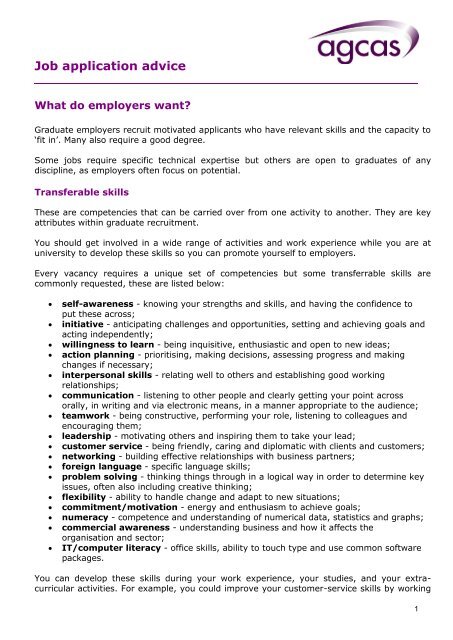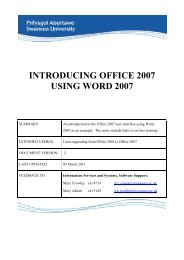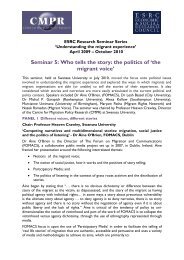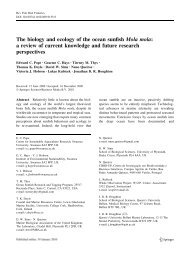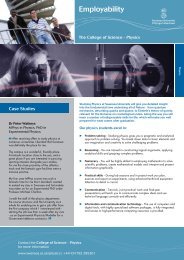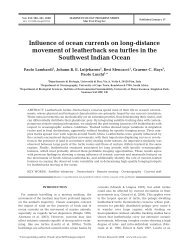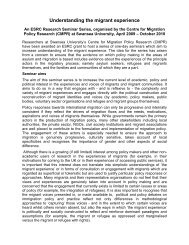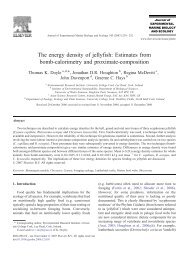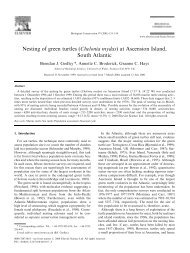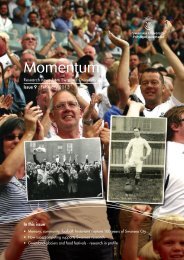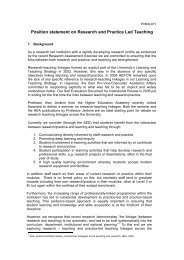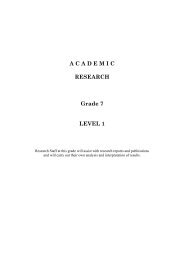Job application advice
Job application advice
Job application advice
Create successful ePaper yourself
Turn your PDF publications into a flip-book with our unique Google optimized e-Paper software.
<strong>Job</strong> <strong>application</strong> <strong>advice</strong><br />
What do employers want?<br />
Graduate employers recruit motivated applicants who have relevant skills and the capacity to<br />
„fit in‟. Many also require a good degree.<br />
Some jobs require specific technical expertise but others are open to graduates of any<br />
discipline, as employers often focus on potential.<br />
Transferable skills<br />
These are competencies that can be carried over from one activity to another. They are key<br />
attributes within graduate recruitment.<br />
You should get involved in a wide range of activities and work experience while you are at<br />
university to develop these skills so you can promote yourself to employers.<br />
Every vacancy requires a unique set of competencies but some transferrable skills are<br />
commonly requested, these are listed below:<br />
<br />
<br />
<br />
<br />
<br />
<br />
<br />
<br />
<br />
<br />
<br />
<br />
<br />
<br />
<br />
<br />
<br />
self-awareness - knowing your strengths and skills, and having the confidence to<br />
put these across;<br />
initiative - anticipating challenges and opportunities, setting and achieving goals and<br />
acting independently;<br />
willingness to learn - being inquisitive, enthusiastic and open to new ideas;<br />
action planning - prioritising, making decisions, assessing progress and making<br />
changes if necessary;<br />
interpersonal skills - relating well to others and establishing good working<br />
relationships;<br />
communication - listening to other people and clearly getting your point across<br />
orally, in writing and via electronic means, in a manner appropriate to the audience;<br />
teamwork - being constructive, performing your role, listening to colleagues and<br />
encouraging them;<br />
leadership - motivating others and inspiring them to take your lead;<br />
customer service - being friendly, caring and diplomatic with clients and customers;<br />
networking - building effective relationships with business partners;<br />
foreign language - specific language skills;<br />
problem solving - thinking things through in a logical way in order to determine key<br />
issues, often also including creative thinking;<br />
flexibility - ability to handle change and adapt to new situations;<br />
commitment/motivation - energy and enthusiasm to achieve goals;<br />
numeracy - competence and understanding of numerical data, statistics and graphs;<br />
commercial awareness - understanding business and how it affects the<br />
organisation and sector;<br />
IT/computer literacy - office skills, ability to touch type and use common software<br />
packages.<br />
You can develop these skills during your work experience, your studies, and your extracurricular<br />
activities. For example, you could improve your customer-service skills by working<br />
1
on the customer service desk in a supermarket, or demonstrate your teamwork skills in a<br />
group project at university.<br />
Work experience/volunteering<br />
Employers greatly value work experience because:<br />
<br />
<br />
<br />
it clearly demonstrates skills and motivation;<br />
skills are easily transferable;<br />
it delivers experience of the workplace.<br />
Voluntary experience is usually as highly valued as paid work. According to Andrea Grace<br />
Rannard, Head of Student Volunteering, Volunteering England:<br />
"Volunteering provides an insight into a profession and a company, allows an individual to<br />
build confidence in a role, develop or enhance relevant skills, generate useful contacts that<br />
can offer "insider" knowledge, and potentially lead to paid positions. Overall, it is a great way<br />
of improving a CV."<br />
Start out by getting any general work experience to put on your CV - your university careers<br />
service should be able to help. Then you could get experience that is more relevant to your<br />
chosen career, perhaps even an internship at the end of your penultimate year (but apply<br />
early).<br />
Relating skills to job opportunities<br />
In order to promote your skills effectively you should outline:<br />
<br />
<br />
<br />
when you have demonstrated the skills required (using specific examples);<br />
how you have performed them to a high level;<br />
a positive outcome.<br />
For example, you could prove your problem solving skills by outlining a specific problem at<br />
work when you weighed up possible solutions, sought <strong>advice</strong>, trialed different resolutions and<br />
effectively communicated your decision, resulting in a solution.<br />
Your <strong>application</strong><br />
Employers use <strong>application</strong> forms to assess your motivation and skills (and your spelling,<br />
grammar and punctuation). Questions are designed to assess specific attributes, so<br />
applicants can be compared systematically.<br />
Before putting pen to paper, carefully research the organisation, the industry and the role<br />
to determine:<br />
<br />
<br />
the skills you need to promote;<br />
what attracts you to the job (your specific motivations).<br />
You can usually find vacant positions and <strong>application</strong> procedures in the „About us‟ or<br />
„Careers‟ section of company websites.<br />
2
Remember - this is a chance for you to promote your relevant qualities so clearly state<br />
what you have to offer and why you should be considered.<br />
Education<br />
Most <strong>application</strong> forms ask you to list all your qualifications and your current education. If<br />
there is little space you may be able to:<br />
<br />
<br />
<br />
summarise key results or module titles;<br />
add a separate sheet;<br />
insert details into the additional information box.<br />
If in doubt, contact the employer to confirm the best strategy.<br />
For non-UK qualifications, you may need to state their UK equivalency. This is usually<br />
done by providing details of how many UCAS points they equate to.<br />
The Universities and Colleges Admissions Service (UCAS) has information on the<br />
comparability of international qualifications as does ENIC-NARIC, which can be accessed<br />
by most careers advisers.<br />
Employment/work experience<br />
List your jobs in reverse chronological order. Include your job title, the name of the<br />
organisation and the name of the town (plus the country if it is overseas).<br />
Describe the responsibilities and achievements in your previous roles that relate to the<br />
skills required in the job you are going for. You can group together or prioritise some<br />
experiences if space is limited.<br />
Interests and achievements<br />
Relate your extra-curricular activities to the skills required. It is more important to<br />
demonstrate relevant skills than list amazing achievements.<br />
References<br />
One of your referees should be work-related, e.g. a manager at work, and one should be<br />
an academic at university – most people use their personal tutor. Follow these tips:<br />
<br />
<br />
<br />
<br />
share your career aspirations and achievements with your referees;<br />
always get permission;<br />
provide their full name and title, postal address, email address and phone number;<br />
keep them informed about the jobs you are going for.<br />
Checklist<br />
<br />
<br />
<br />
<br />
<br />
Print the form (if possible) and check your work before sending it out.<br />
Ask someone to read through it as you might not be able to see your own mistakes.<br />
Keep a copy of your <strong>application</strong> form along with the job advert/job description to<br />
prepare for your interview.<br />
Carefully check your spelling and grammar as poor English is the main reason why<br />
most <strong>application</strong>s are rejected.<br />
Use short sentences/paragraphs which are easy to follow.<br />
3
Use one idea per paragraph and state the key information in the first sentence.<br />
Be concise.<br />
Avoid jargon.<br />
Use active verbs.<br />
Do not repeat yourself.<br />
Online <strong>application</strong>s<br />
Most large graduate recruiters now take <strong>application</strong>s online. They use sophisticated<br />
systems which enable you to build your education/employment profile and answer specific<br />
questions. You may also be able to upload other documents such as a CV and a covering<br />
letter.<br />
Access<br />
When you first register your <strong>application</strong> on an organisation‟s website you will usually be<br />
given a password which will enable you to save your work when you need a break. If you<br />
have a few <strong>application</strong>s on the go, make sure you have some way of remembering all your<br />
passwords. Modern online <strong>application</strong>s can usually be amended as many times as you<br />
want, before the closing date, and printed off, but this is not always the case. Follow these<br />
tips:<br />
<br />
<br />
<br />
familiarise yourself with the particular <strong>application</strong> system before you start;<br />
regularly copy your answers into your normal word processor to save them in case<br />
the system crashes;<br />
avoid filling in the form at the last minute because the organisation‟s server could<br />
be overloaded and you may miss the deadline.<br />
Style<br />
Just like all <strong>application</strong>s, your answers should be formal and targeted at the skills required. The online<br />
system will probably restrict you to a particular text format (e.g. font size and style), be aware of this<br />
when you draft your answer.<br />
Accuracy<br />
Online <strong>application</strong>s are often less carefully completed than old-fashioned forms – do not<br />
fall into this trap.<br />
<br />
<br />
<br />
<br />
<br />
<br />
Make sure your word-processor‟s spell-check is set to assess English as it is written in<br />
the UK (not the USA).<br />
Check your spelling using the spell-check.<br />
Personally check your spelling and grammar.<br />
Make sure you have comprehensively answered every part of every question.<br />
Check you have stuck within the stated word (or character) limit. Many forms will force<br />
you to do this, but not all.<br />
Get someone else to check your answers, preferably a careers adviser.<br />
Personality profiling<br />
4
Some <strong>application</strong> forms include multiple-choice questions about your likes, strengths and<br />
preferences. These can be used to identify whether your preferred style of working fits<br />
with the culture of the organisation and the skills they require. Be as honest as possible –<br />
some questions might be repeated to ensure your answers are consistent and some may<br />
test whether you are trying to make a favorable impression.<br />
Select Simulator is an online resource designed to help students and graduates with online<br />
<strong>application</strong>s.<br />
Example questions<br />
Application form questions usually assess:<br />
<br />
<br />
<br />
how your education, work experience and extra-curricular activities relate to the<br />
vacancy;<br />
why you want to work in that particular role/organisation/industry, i.e. your<br />
motivation;<br />
your skills that are relevant to the role.<br />
You should answer questions concisely and include key words from the job<br />
advert/description. Some questions are long and complicated – make sure you answer<br />
each specific section.<br />
Sometimes, it can be very difficult fitting your answer into the word limit provided. If this<br />
is the case, write whatever comes into your head and edit your work later by getting rid of<br />
too much detail and anything you have repeated.<br />
Different forms may look similar but the questions may differ slightly, so do not cut and<br />
paste your answers from previous <strong>application</strong>s without amending what you have written.<br />
Common questions<br />
Some typical questions are outlined below along with <strong>advice</strong> on how they should be<br />
tackled.<br />
Please outline your work experience. Provide details for each of your roles<br />
including the dates you undertook that activity, the name of the organisation,<br />
your job title and responsibilities.<br />
Relate your responsibilities to the vacancy. List your relevant roles, even if they were not<br />
necessarily your main duties. For example, if you are going for a job as a primary school<br />
teacher and you have worked in a fast food restaurant you could list your responsibilities<br />
as follows:<br />
„Maintaining excellent customer service for a wide range of people, managing parties for<br />
children, ensuring that activities were fun and safe and working in a close knit team‟<br />
Give details of your main extracurricular activities and interests to date. What<br />
have you contributed and what have you got out of them?<br />
This question is designed to assess two key elements:<br />
5
your motivation to get involved in activities outside the curriculum;<br />
your ability to relate your extracurricular activities to the specific skills required in<br />
the vacancy.<br />
To answer this sort of question, identify the key skills required by the specific recruiter and<br />
outline recent activities which clearly demonstrate your ability to carry them out. You<br />
should also explicitly outline how your experiences and achievements have prepared you<br />
for that specific role.<br />
What is your greatest achievement to date?<br />
This question is similar to the previous one but you can also outline an activity at<br />
university.<br />
You should emphasise why you consider your achievement to be „great‟ in relation to the<br />
vacancy requirements, plus state what the experience has taught you. This may be picked<br />
up for further discussion in an interview.<br />
What attracts you to our firm?<br />
Show that you have a clear understanding of the organisation‟s values and ethos and that<br />
they match yours. The more research you do, the better, as it demonstrates a real<br />
motivation to work for that specific organisation. Look on their website and trawl the<br />
internet to find genuine reasons for applying.<br />
If you can visit their stand at a careers event, ask their representatives what they enjoy<br />
about working for that firm, and quote them in your answer (using their full names).<br />
What attracts you to this role and this service line?<br />
Here, you need to demonstrate a clear understanding of the job you are going for and that<br />
you have carefully assessed that it suits your interests and motivations. Again, take some<br />
time to find out as much as you can about the role and clearly state the specific elements<br />
that you find attractive.<br />
Competency-based questions<br />
These assess your relevant skills to succeed in the role. Typically, you need to outline a<br />
specific example of when you have demonstrated a particular skill, how you have<br />
performed it well (in detail), and the positive outcome.<br />
Stress your personal contribution and use recent examples from each walk of life,<br />
especially your work experience.<br />
Typical competency questions include:<br />
Give an example of a problem you have solved that required analysis. What<br />
methods did you use and what conclusions did you reach?<br />
<br />
<br />
Briefly outline a situation where you have solved a problem (10% of your answer).<br />
Outline the strategy you personally used to solve the problem. For example, you<br />
could highlight your initiative, creativity or effective use of resources (80% of your<br />
answer).<br />
6
Give a brief positive ending that puts you in a good light (10% of your answer).<br />
Describe a time when you were working under pressure with competing<br />
deadlines and it was impossible to meet them all. What was the situation and<br />
what did you do?<br />
<br />
<br />
<br />
Briefly outline a situation where you have demonstrated your ability to work under<br />
pressure. Try to pick an example that reflects well on your organisational skills<br />
(10% of your answer).<br />
Outline the strategy you personally used to succeed under pressure. For example,<br />
you could highlight how you prioritised tasks, made efforts to renegotiate the least<br />
urgent deadlines, delegated tasks to others and communicated progress (80% of<br />
your answer).<br />
Give a brief positive ending that puts you in a good light (10% of your answer).<br />
Tell us about an occasion when you had to communicate complex information.<br />
Why did you have to do this and how did you go about it? Did you achieve your<br />
desired result?<br />
<br />
<br />
<br />
<br />
Briefly outline a situation where you have demonstrated your ability to<br />
communicate complex information (10% of your answer).<br />
Outline why you had to do this (10% of your answer).<br />
Outline the strategy you personally used to communicate effectively. For example,<br />
you could highlight how you listened empathically, responded quickly and<br />
sensitively to people‟s queries, used clear and succinct written communication, and<br />
appropriate body language (70% of your answer).<br />
Give a brief positive ending that puts you in a good light (10% of your answer).<br />
Describe a difficult team project you have worked on, the result that was<br />
achieved and how you achieved it.<br />
<br />
<br />
<br />
Briefly outline a difficult team project you have worked on (10% of your answer).<br />
Briefly outline the result and what you learned from it (20% of your answer).<br />
Outline how you personally worked effectively with others. For example, you could<br />
highlight how you encouraged people, made sure that everyone performed their<br />
personal responsibilities (including yourself), managed time and and supported<br />
colleagues who were struggling (70% of your answer).<br />
Even though this is a team situation focus on your personal contribution to the team (use<br />
„I‟ not „we‟).<br />
Personal statements<br />
Sometimes, you are asked to complete a personal statement which outlines your reasons<br />
for applying and/or promotes your relevant knowledge, skills and experience.<br />
To outline your reasons for applying, describe what attracts you to the organisation and<br />
the specific role. Your statement should enthusiastically demonstrate the following:<br />
<br />
a clear understanding of the organisation‟s motives, values and ethos and how they<br />
match yours;<br />
7
a sound appreciation of the specific role and why it suits your specific interests and<br />
motivations.<br />
The more research you do to identify attractive features of the job and organisation – the<br />
better, as it demonstrates real motivation.<br />
To promote your relevant attributes you should address all the points on the job<br />
advert/personal specification in the order in which they appear - you may even want to<br />
use them as headings. Imagine the specification is being used as a checklist by the person<br />
short-listing.<br />
Address each point on the job specification in a clearly themed paragraph.<br />
<br />
<br />
<br />
In your first sentence summarise how you meet the specific requirement.<br />
In the next few sentences provide a recent example of how you have successfully<br />
demonstrated that specific attribute. Work experiences are especially popular with<br />
employers. Remember to focus on how you successfully carried out the activity, not<br />
just on what you did.<br />
In your final sentence outline a positive outcome and reflect on how the experience<br />
helped you develop the attribute you are describing.<br />
Example – To show your commitment to equal opportunities:<br />
„Throughout my personal and work life I have always demonstrated a commitment to<br />
equal opportunities by being sensitive to, and inclusive of, the cultures and circumstances<br />
of other people. In 2009, I worked as a mentor/facilitator to a group of students on the<br />
Aim Higher project to encourage pupils from non-traditional backgrounds to consider<br />
university. I designed projects and activities that recognised and focused on the diverse<br />
experience within the group to ensure participation. The programme was successful for<br />
the pupils and a rewarding learning experience for me. The experience showed me that<br />
working together with mutual respect is both productive and rewarding.‟<br />
Speculative <strong>application</strong>s<br />
Speculative approaches can be an effective way to open doors, find experience, network,<br />
and get some references. In some industries it is the normal entry route to a career.<br />
Below is a list of things to take into consideration when making a speculative <strong>application</strong>.<br />
<br />
<br />
<br />
<br />
<br />
<br />
Identify employers who might be interested in your dissertation, recruit graduates<br />
with your degree or suit your skills.<br />
Learn about the company, their organisational structure, trends in their field,<br />
competitors, and any areas of growth or change. The internet is a good place to<br />
start.<br />
Find out who to send your CV to and address it for their attention (you may be able<br />
to find them on LinkedIn).<br />
Clearly state what you are looking for. For example, you might want a job, an<br />
internship, work experience, work shadowing or some project work.<br />
Outline the skills and experience you have to offer.<br />
Include the dates when you are available.<br />
8
Follow up your letter with a telephone call to show your genuine interest and see if<br />
you can arrange a meeting to discuss job possibilities, review your <strong>application</strong>, or<br />
gain further contacts.<br />
Create a network of influential people. To be most effective, combine contacts from<br />
all sources, such as your personal and professional networks. Ask people, including<br />
lecturers or past students, for contacts who may know of opportunities in a<br />
particular sector.<br />
Analysing job adverts<br />
Before applying for a job, you need to thoroughly research the skills, knowledge and<br />
commitment required.<br />
You can research the requisite attributes by analysing the job advert and job description.<br />
To find out more about an employer‟s needs and apply speculatively you could also look at<br />
the organisation‟s website, contact their graduate recruiter directly, and look up key<br />
contacts on LinkedIn.<br />
To analyse adverts/job descriptions you need to look for both stated and implied<br />
requisites, this can take some practice and you may want to ask a careers adviser for<br />
help.<br />
Three typical job adverts are shown below, along with <strong>advice</strong> on how they can be analysed<br />
in terms of the skills, knowledge and commitment required.<br />
High Roller Group<br />
The High Roller Group has, for twenty years, been the consulting service of choice for the<br />
life insurance and pensions markets in the financial services sector.<br />
Our approach to client service delivery is to work in teams to translate strategic vision and<br />
objectives into systems and processes that succeed. High Roller‟s ethos and success is<br />
based on the ability to focus our expertise on the knowledge and experience of the client.<br />
To enable them to grow and deliver, we develop strong and ongoing relationships with our<br />
clients. Our business and tradition is based on „partnership for progress‟.<br />
Work offered: Trainee Decision Maker; Data Gatherer/Investigator.<br />
Subject of Study: 2:1 in any degree discipline, (ideally supported by A-level maths, but<br />
not essential). 2:2 graduates will be considered on an individual basis.<br />
Locations: London, Manchester, Leeds, Birmingham, Glasgow, Edinburgh. Apply: Please<br />
send your CV and covering letter to Ms L Groom, Graduate Recruitment Manager, The High<br />
Roller Group, Blue Base Road, Birmingham, B1 2BE<br />
Analysing the advert<br />
The requirements of this job are as follows:<br />
Stated attributes:<br />
2:1 in any discipline (2:2 graduates will be considered).<br />
A-level maths (ideally).<br />
9
Implied attributes:<br />
an understanding of the pensions markets in the financial services sector (the High<br />
Roller Group‟s sector);<br />
teamwork (“Our approach to client service delivery is to work in<br />
teams”/”partnership for progress”);<br />
problem solving (“translate strategic vision and objectives into systems and<br />
processes that succeed”);<br />
client focus/interpersonal skills (“ability to focus our expertise on the knowledge<br />
and experience of the client”);<br />
data gathering/investigation (“Work offered: Trainee Decision Maker; Data<br />
Gatherer/Investigator”);<br />
numeracy (“ideally supported by A-level maths, but not essential”).<br />
Matching your skills<br />
Once you have analysed the attributes required in a vacancy you need to prove them in<br />
your CV or <strong>application</strong> form. For example, to prove your teamwork skills to The High<br />
Roller Group you could write:<br />
“During my internship at Company X I demonstrated excellent teamwork skills in a busy<br />
financial environment, such as an ability to listen to clients and managers, perform my<br />
role to a high level and support colleagues, resulting in an early promotion.”<br />
To prove your data gathering skills:<br />
“At Company Y I developed excellent data investigation skills such as an ability to use a<br />
range of sources, check findings and question conclusions, resulting in a key role helping<br />
business clients develop efficient systems.”<br />
Whittear Travel Consultancy<br />
One of the UK‟s leading specialists in tailor-made tours and cultural holidays to North<br />
Africa, the Middle East, and Asia, is looking for a recent graduate to train as a Travel<br />
Consultant. We are committed to providing the best service to our clients whilst supplying<br />
a unique holiday adventure to suit their individual needs. We believe you will thrive with<br />
our twelve month training plan which will give you the opportunity to experience all<br />
aspects of our business.<br />
Responsibilities will include dealing with client enquiries; selling worldwide tailor-made<br />
holidays and creating itineraries; booking tours and reserving flights through suppliers;<br />
preparing client travel documentation; managing bookings and general customer service.<br />
Candidates must have a relevant degree (2:2 or higher); initiative; team skills; the ability<br />
to communicate effectively; good administrative skills; experience of travellers‟ needs;<br />
excellent customer service skills; sales knowledge and preferably language skills.<br />
To apply, send us your CV, or upload it directly to our website.<br />
Analysing the advert<br />
The requirements of this job are as follows:<br />
Stated attributes:<br />
10
a relevant degree;<br />
initiative;<br />
team skills;<br />
the ability to communicate effectively;<br />
good administrative skills;<br />
experience of travellers‟ needs;<br />
excellent customer service skills;<br />
sales knowledge;<br />
language skills (preferably).<br />
Implied attributes:<br />
an understanding of the travel industry, especially relating to North Africa, the<br />
Middle East and Asia.<br />
the ability to sell (“selling worldwide tailor-made holidays”).<br />
Matching your skills<br />
To demonstrate your initiative skills to Whittear Travel Consultancy you could write:<br />
“Successful study and work in Spain and Mexico show that I can creatively develop my<br />
skills and experience and adapt to new and different environments.”<br />
To prove your sales knowledge/skills:<br />
“Raised sales at Company Z by 12% by up selling add-on packages to new and existing<br />
customers”<br />
Post Doctoral Position - Business Strategy/Regulation of Urban Utilities<br />
Located in Bruges, Belgium, the Federal Institute of Technology consistently ranks among<br />
the best universities in Europe and the World. The Chair Management of Network<br />
Industries within the College of the Management of Technology invites <strong>application</strong>s for a<br />
post doctoral position in business strategy for urban utilities.<br />
Required qualifications:<br />
A PhD in management, business, economics, or political science.<br />
Research and publications in business strategy/regulation in one or several of the<br />
following industries: energy, communications, transport, and/or environmental<br />
services.<br />
Fluency in English. A working level understanding of written and spoken French will<br />
be a distinct advantage.<br />
Main responsibilities:<br />
Organise a new Executive Master (EM) in Urban Utilities Management (UrbUtil).<br />
Manage the administration, logistics and curriculum of the EM in UrbUtil.<br />
Conduct research on business strategy in network industries.<br />
Participate in international conferences in academic and business circles.<br />
Contribute to teaching in the EM in UrbUtil.<br />
An initial one-year contract will be offered with the possibility of a permanent position<br />
depending on the success of the Executive Masters programme. Please send letter of<br />
<strong>application</strong>, curriculum vitae, and names of at least three referees to Dr Michele<br />
Berryman.<br />
11
Analysing the advert<br />
The requirements of this job are as follows:<br />
Stated attributes:<br />
a PhD in management, business, economics or political science;<br />
various research publications;<br />
fluency in English and preferably a working level understanding of written and<br />
spoken French.<br />
Implied attributes:<br />
the ability/willingness to work in Bruges, Belgium (“Located in Bruges”);<br />
organisational skills (“Organise a…”);<br />
module design (“Organise a new Executive Master (EM) in Urban Utilities<br />
Management”);<br />
curriculum administration/management (“Manage the administration, logistics and<br />
curriculum”);<br />
ability to conduct relevant research (“Conduct research on business strategy in<br />
network industries”);<br />
participation in conferences and business circles (“Participate in international<br />
conferences in academic and business circles”);<br />
teaching (“Contribute to teaching in the EM”);<br />
the ability to quickly adapt (“An initial one-year contract will be offered”).<br />
Matching your skills<br />
To demonstrate your teaching skills for this role you could write:<br />
“I have delivered seminars in „Conservation theory‟ and „Environment modelling‟ to groups<br />
of 10-20 undergraduate students and planned teaching methods.”<br />
To prove your ability to conduct relevant research:<br />
“In close collaboration with the Centre for Finance, The Wales Development Agency and<br />
Groundwork Wales, my thesis investigates novel modelling tools and analytical models”.<br />
Common mistakes<br />
Most graduate employers get numerous <strong>application</strong>s but you have a good chance of<br />
standing out from the crowd if you research the role and target your submission.<br />
If you are not being shortlisted or getting any interviews, reflect on your strategy and talk<br />
to a careers adviser about how you can make improvements.<br />
The common mistakes are outlined below.<br />
Poor spelling and grammar<br />
Graduate recruiters report that over 50% of <strong>application</strong> forms are rejected for this reason.<br />
To minimise your chances of error:<br />
12
use short sentences;<br />
edit your work a number of times;<br />
use your computer‟s word-count facility to make sure you keep to the correct<br />
number of words;<br />
print your <strong>application</strong> off and read through it carefully;<br />
make sure your spell-check is set to UK English.<br />
Finally, give your work to someone else to spot the mistakes you have missed and let<br />
your careers adviser look through it.<br />
Not answering the questions<br />
Applicants often do not answer every aspect of every question and are therefore not<br />
short-listed. To avoid this mistake, read each question carefully and list its constituent<br />
parts. For example, if you are asked the following:<br />
“Tell us about a time when you have worked as a member of a team. Describe your<br />
personal contribution, how you faced any problems that arose and the outcome.”<br />
Your answer needs to describe four things:<br />
<br />
<br />
<br />
<br />
a specific example of when you have worked in a team;<br />
your personal contribution;<br />
how you dealt with any problems;<br />
the outcome.<br />
Not outlining how you perform relevant skills<br />
In your answers you need to clearly outline how you have performed the skills required.<br />
Unfortunately, many applicants focus too much on what they have done, rather than how<br />
they have done it well. One way to prepare your answer is to:<br />
<br />
<br />
<br />
identify the skill required;<br />
think of a specific experience where you have demonstrated that skill;<br />
identify three ways in which you performed that skill to a high level.<br />
For example, if you are asked about organisational skills, you could identify a difficult<br />
project at work where you planned carefully, managed your time effectively and regularly<br />
assessed your progress.<br />
Underselling yourself<br />
Application forms are an opportunity to promote your unique attributes, and stand out<br />
from the crowd. Be positive about what you have to offer, and clearly outline how you<br />
have demonstrated the skills required.<br />
See the suggestions in the 'what do employers want?' and 'power words' sections.<br />
Restricting your range of <strong>application</strong>s<br />
13
Most graduate opportunities are not limited to graduates with specific degrees. If you are<br />
having no success with your current <strong>application</strong>s, you could look for a career in other<br />
fields.<br />
For example, if you are studying law you could apply to be a solicitor or barrister, but you<br />
could also try to become a licensed conveyancer, management consultant or primary<br />
school teacher.<br />
Getting into competitive areas<br />
Some areas of employment are highly competitive such as broadcasting, advertising,<br />
publishing and journalism. If you are having trouble getting into your chosen career, try to<br />
make yourself more attractive by developing the skills required in another way.<br />
A good way to gain experience and make contacts is through voluntary or unpaid work<br />
shadowing. You could also consider working in a related field where you can hone your<br />
skills, while you continue to apply for your dream job.<br />
Not looking widely enough<br />
Some students and graduates only consider the large company graduate training schemes<br />
that appear in the Prospects Directory rather than those of small to medium-sized<br />
enterprises (SMEs).<br />
With a downshift in the economy, there may be fewer traditional graduate placements on<br />
offer and today‟s graduates should look further afield. Small and medium sized enterprises<br />
(SMEs) can provide wider experiences and more responsibility.<br />
Managing potential difficulties<br />
You may have background constraints or issues that are a disadvantage. Always present<br />
this information positively. Demonstrate what you have learned, how you have overcome<br />
any difficulties and the coping strategies you have developed. Employers often look for<br />
evidence of problem solving, so you can use this as an example.<br />
Many employers use academic results as an initial selection tool. If you do not meet all the<br />
academic criteria, you could contact them and ask to be considered on other merits such<br />
as your experience. You may also want to explain low grades in your covering letter. It is<br />
better to tackle the issue than to either deselect yourself or ignore the criteria.<br />
Always seek feedback<br />
If you think that you have put in a good <strong>application</strong> but have not been short-listed, ask for<br />
some feedback. This is not always forthcoming, but sometimes you will be able to find out<br />
exactly why your <strong>application</strong> failed. This may help you to improve your skills and your<br />
future <strong>application</strong>s.<br />
It is often difficult to hear constructive criticism, but remember not to react in a negative<br />
manner. Say thank you to whoever gives you feedback, and learn from your mistakes.<br />
Power words<br />
14
Recruiters see numerous unremarkable <strong>application</strong>s. You can stand out from the crowd by<br />
using direct, positive and appropriate language.<br />
Subheadings and bullets<br />
A good way to highlight key information in a CV or personal statement is to use<br />
subheadings and bullet points. Subheadings should be linked to the organisation‟s specific<br />
requirements. The first word in a bullet point should be an active verb such as „organised‟<br />
or „delivered‟.<br />
Be positive<br />
Always describe your attributes and experiences in positive terms, and avoid putting<br />
yourself down. The below lists show how some negative statements can be improved.<br />
Negative statements<br />
I feel I am a good communicator.<br />
I believe in diversity and equal opportunities.<br />
During this experience I had to manage seven people.<br />
Even though I failed to achieve my target, I learned a great deal about managing<br />
projects.<br />
Some people have told me that I have good communication skills.<br />
I have had a few relevant experiences.<br />
Expressing things more positively<br />
I am a good communicator.<br />
I am committed to diversity and equal opportunities.<br />
During this experience I successfully managed seven people.<br />
Through this experience I learned a great deal about project management.<br />
I have excellent communication skills.<br />
I have substantial relevant experience.<br />
Themed paragraphs<br />
Each paragraph in your cover letter, CV and <strong>application</strong> form should be short and focused<br />
on one message. In personal statements, link each paragraph to a specific job criterion.<br />
Revise and edit<br />
Review your text and make any necessary changes so it is clear, precise and convincing,<br />
and get someone else to look at it. That way, the employer is more likely to understand<br />
the message you want to put across.<br />
Words to use<br />
Experience<br />
Demonstrated skills in…<br />
Extensive academic/practical background in…<br />
Experienced in all aspects of…<br />
Knowledge of/experienced as/proficient in…<br />
Provided technical assistance to…<br />
Ability<br />
Trained in…<br />
15
Proficient in/competent at…<br />
Expert at…<br />
Working knowledge of…<br />
Coordinated…<br />
Organised…<br />
Success<br />
Promoted to…<br />
Succeeded in…<br />
Proven track record in…<br />
Experience involved/included…<br />
Achieved…<br />
Instrumental in…<br />
Delivered…<br />
Responsibilities<br />
In charge of…<br />
Supervised/coordinated…<br />
Familiar with…<br />
Employed to/handle…<br />
Assigned to…<br />
Project managed…<br />
Roles<br />
Analysed/evaluated…<br />
Established/created/designed…<br />
Formulated…<br />
Initiated…<br />
Managed…<br />
Presented…<br />
Personal attributes<br />
Committed to…<br />
Confident…<br />
Enthusiastic user of…<br />
Thorough...<br />
Actively sought…<br />
FAQs<br />
Do I have to tell an employer about my criminal record?<br />
You have to declare all criminal convictions, or any still pending, unless they are „spent‟. A<br />
criminal record will not necessarily prevent you from getting into your career.<br />
Certain jobs and courses such as teaching, health and social work are „excepted‟ from the<br />
Rehabilitation of Offenders Act 1974 (ROA) and require that you disclose all convictions,<br />
even those that are spent.<br />
If you have concerns about this ask your careers adviser for <strong>advice</strong>.<br />
Should I disclose my disability to an employer and if so, when?<br />
16
The decision is yours to make, but generally it is considered wise to be upfront with<br />
employers in your covering letter. If this worries you, you might try targeting employers<br />
with a demonstrated commitment to being disability friendly. Check whether the company<br />
recruitment literature includes a policy statement on disability, whether its job advertising<br />
carries the „two ticks‟ symbol, and whether it is a member of the Business Disability<br />
Forum. However, limiting your <strong>application</strong> to these companies may restrict your<br />
employment opportunities.<br />
What is the <strong>application</strong> process for jobs outside the UK?<br />
Application styles vary from country to country. Some countries prefer CVs that<br />
emphasise factual information or personal details. Employers in other countries might<br />
require written references and exam transcripts to be sent with your <strong>application</strong>. Others<br />
may require two CVs, one accurately presented in their native language and perhaps<br />
another in English.<br />
Will my sexuality, ethnic origin, age, gender or political affiliations affect<br />
my job <strong>application</strong>?<br />
These factors should not be considered by prospective employers.<br />
You do not usually have to supply any of this personal information to recruiters but, of<br />
course, your name may point to your sex and ethnic origin, and your school dates will<br />
indicate your age.<br />
Even though sex, age and racial discrimination are illegal, there are indications that they<br />
do still exist.<br />
One of the best ways to reduce the risk of unfair discrimination is to market yourself so<br />
effectively that employers cannot ignore your suitability for the post.<br />
It is important to think positively. Concentrating on your strengths can help to counter<br />
any negative stereotypes and provide clear evidence of your suitability for the job.<br />
You may prefer to select employers who:<br />
<br />
<br />
<br />
have publicised equality and diversity statements covering existing policies and<br />
practices;<br />
openly target minority groups;<br />
are listed by civil rights organisations.<br />
Written by Steve Rook, AGCAS, April 2011<br />
© Content copyright of or licensed to AGCAS (www.agcas.org.uk)<br />
To view the terms and conditions for the material provided in this publication, please see:<br />
www.agcas.org.uk/disclaimer<br />
17


